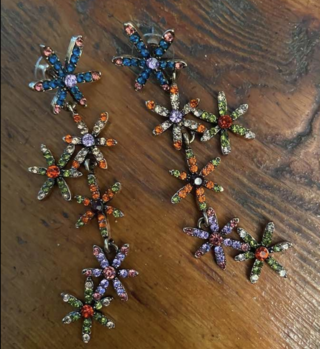Jealousy
Jealousy and Envy Go Deeper Than You Think
Could my cognitive approach help you overcome jealousy and envy?
Posted July 8, 2021 Reviewed by Jessica Schrader
Key points
- When you grow up without approval, it's hard to approve of yourself.
- Tired of feeling jealousy and envy? Give those toxic twins to an avatar.
- By using an avatar for feelings like jealousy or envy, they may lose their power.

Right now, I am riddled with the toxic triumvirate: Jealousy, Envy, and Panic. They're making themselves comfortable, settling in. Oh wait, they’ve brought their buddy, Depression, along.
But why? Shouldn’t I feel happy and secure? The hardback of my novel With or Without You did great, and now the paperback is just out and it seems to be doing well and yet I find myself in the Valley of Nervous Wreckdom. I worry constantly about how the book is really doing. I was so anxious about whether or not my local store, Little City Books, had the book that I was too humiliated to check myself, and instead made Jeff, my husband, go in (the paperback was on the front table) but it only made me feel better for a second. And then I still worried about whether anyone would pick it up, whether they would buy it, and if they didn’t buy it, would my publisher then drop me, because who did I think I was?
There it is. That drumbeat of doubt. It is all exhausting.
I know somewhat what to do about it. I focus on my work instead of the outcome, and that helps for a while. I praise the authors I am envious and jealous of because I do indeed love their work and writers are all swimming in the same ocean, keeping one another afloat. I remind myself that one person’s success is not my own failure.
But it’s not enough. And the title of my post should tell you why. These feelings go deep, deep, deep into family.
Growing up, I was never good enough. And however I failed was always my fault. When I didn’t get a part in the school play, I was told it was because who would want someone who looked like me on the stage? Look how gorgeous my older sister was, and why couldn’t I be more like her because she surely would get any part she tried out for? When I got married early and my first husband left me, I was told not to tell anyone because they would think there was something wrong with me. I was told that I must fix it, because he was the prize and I had been so lucky to marry someone like him and I’d better be careful because someone else was going to snap him right up from under me and then I would have nothing. Could I throw dinner parties to change his mind? Could I have a baby to keep him at home? Maybe I could study my happily married friends to see what I was lacking? All of this made me more desperate.
When I finally did have success, a first novel in my 20s that was feted everywhere, that accomplishment was somehow denigrated in my family. My mother, whom I loved in a complicated way, did tell me how proud and excited she was, but there was a catch. My mother loved to say, “You got that talent from me!” Or she would show off my novels as “my daughter’s” books. That always made me feel uneasy, as if I couldn’t really own my success because part of it belonged to her, too. I invited her to a reading in Boston once, during a snowstorm, and she kept telling me that no one would show up in this weather, plus, people were busy, and I shouldn’t be surprised if the store was closed. When we got there, the bookstore was overflowing! But my mother’s shock at my large audience tamped down some of my joy, wobbling my legs and my spirit. Later, when I made the New York Times bestseller list, my mother said, "Are you sure? The real New York Times?" My older sister, whom I adored, never commented on my success at all, until, embarrassed I had to ask her what she thought of my writing, my books. She shrugged. “They’re OK,” she said dismissively waving a hand. And then she raved about another book that she had really loved and found worthy. Those messages were splinters, always just under my skin.
So when your family isn’t happy for your success, when the message imprinted on you is that you are not good enough, or certainly not as good as another person—well you can see where this is going. I began to feel more and more jealousy, envy, and panic because I bought into those messages. I wasn’t enough. I could never be enough. But other people were enough. In fact, they were more than enough. So of course when I did have success, I didn’t quite believe it. On a bestseller list? A great review? Well, the person probably felt sorry for me. Or maybe they owned my publisher a favor. Nothing could convince me otherwise. And my jealousy and envy grew.
So what helped me? Loving friends. I was at the Tucson Book Festival with the writer Victoria Zackheim for my novel Is This Tomorrow. My event hadn’t gone well and the day was broilingly hot and we were sitting at a table when I burst into tears because I wanted to be like some of the other writers here, all of whom had packed houses. Victoria was quiet for a minute and then she said, “If you won the Pulitzer Prize, would you feel like you were enough?” I thought about that question, and it brought me up short, because I realized the answer was no. No, never. All that week I was still upset, grappling with this, and then I got news: the book made the New York Times Bestseller list. But even then, the joy I had about this lasted for about 10 minutes. Because the hole I needed to fill wasn’t really about success, it was about self-worth and I was looking in all the wrong places.
Another author friend helped me, too, with a cognitive therapy approach. Leora Skolkin-Smith and I came up with avatars for our insecurity. Mine was the Clockman, named after this terrifying clock-that-looked-human which was on the psychiatric hospital down the block from where I grew up. I found a photo of a Clockman, with a particularly stupid, nasty face and I kept it by my desk. Whenever I felt terrible, I imagined all those mean messages were not coming from a true place, but from the Clockman. I thought, “Oh it’s that idiot Clockman doing this to me, wanting me to feel small.” Just looking at the Clockman photo diffused a lot of my anxiety because when I thought about, how could something with such a moronic-looking face have any sway over me? What had he done that I should believe anything he hissed at me? Instead, I could laugh at him. I could vanquish him. The Clockman wasn’t real. But I was. And that meant I had the power, not him.

Of course, I yearn for success. Doesn’t everyone? Of course, I sometimes think that every other writer is happy, secure, and successful without any stress or worry and it is only me who suffers, but then I give that thought to the Clockman and I feel better.
Of course I yearn for all of you to buy With or Without You and tell your friends and love it. But now I know that my self-worth is not contingent on whether that happens or not. I am rewiring my brain. Every day I want to make it harder and harder for those toxic emotions to grab hold of me, until maybe one day, they won’t be able to even gain a foothold.


